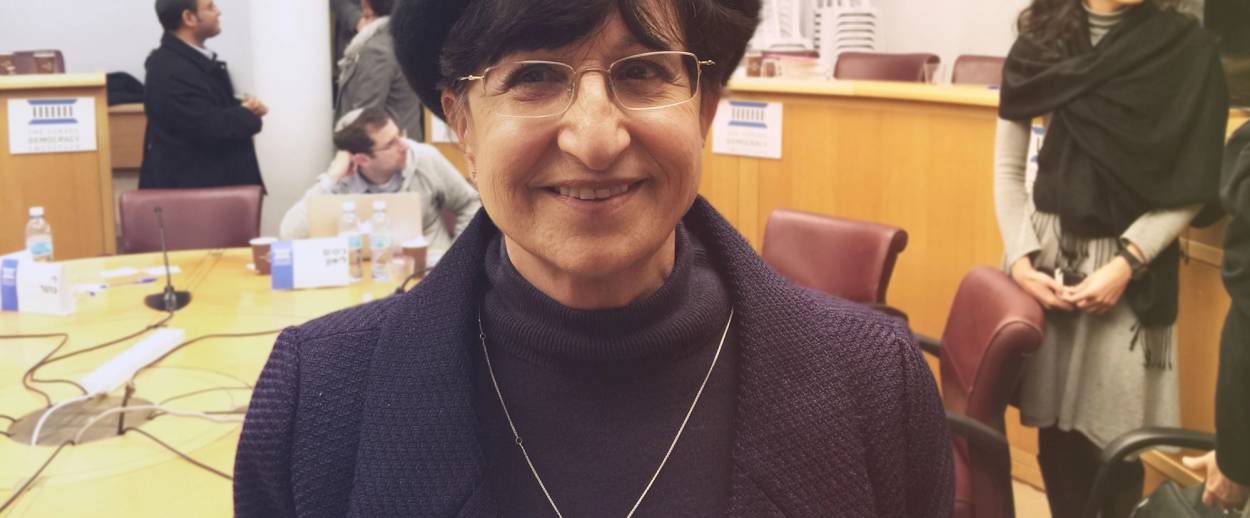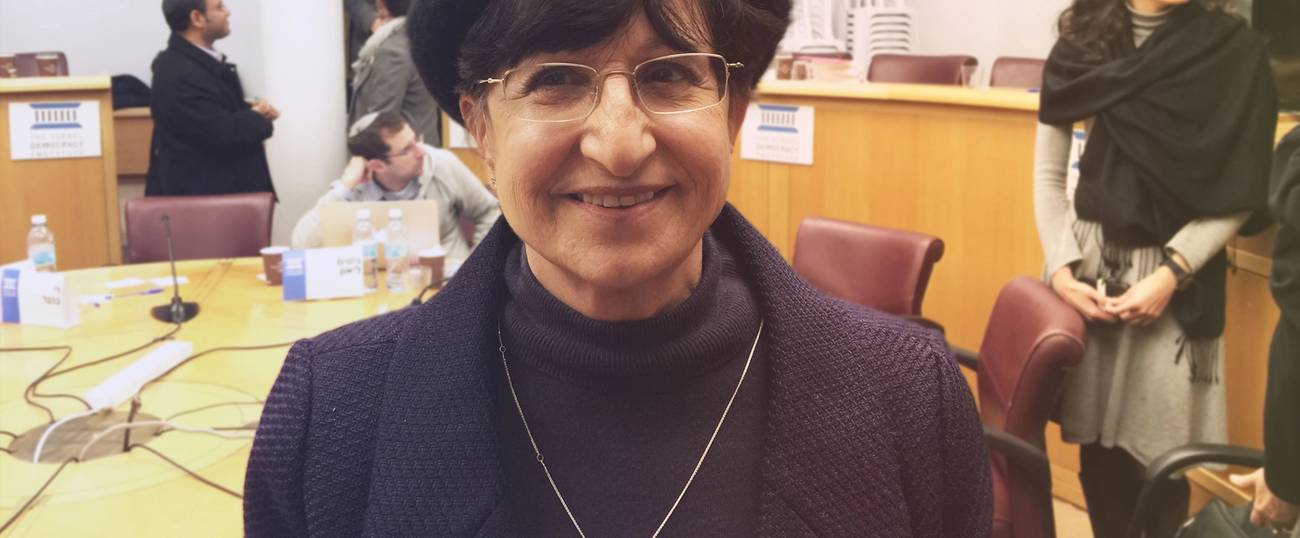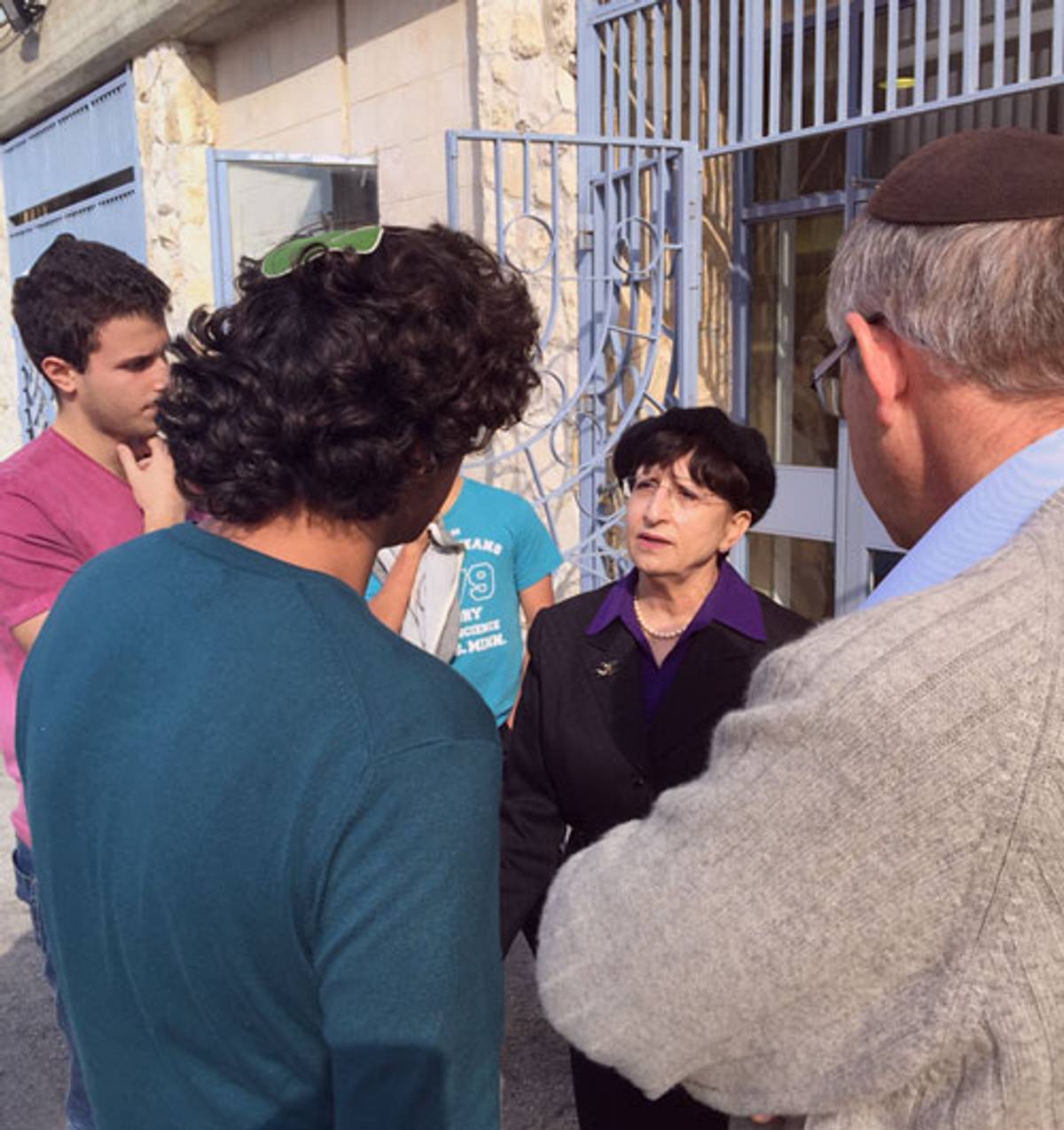Adina Bar Shalom was 4 when two plainclothes policemen entered her family home in Cairo, where her father, Ovadia Yosef, was serving as Egypt’s deputy chief rabbi. The War of Independence had recently erupted between nascent Israel and its Arab neighbors, and—obsessed with domestic subversion—Egyptian authorities were busy searching Jewish homes for weapons.
“They didn’t believe he had no weapons. He showed them his books and said: ‘These books protect me. I’m a rabbi,’ ” she reminisced recently.
Convinced that the policemen would not arrest a man with two young toddlers, Bar Shalom’s mother Margalit ordered her and her younger brother Yaakov to cling to their father’s legs and never let go. It worked; the rabbi was left alone.
“Imagine that, a 4-year-old girl thinking she needs to save her father because her mother told her so,” she said.
Today, more than 65 years later, Adina Bar Shalom remains fiercely loyal to Rav Ovadia, widely regarded as the most prominent Sephardic scholar of the 20th century. But two years after his death, his eldest daughter observes with alarm—and a measure of disgust—as Ovadia’s legacy atrophies. Shas, the political movement he founded in 1984, is now controlled by an ultra-conservative rabbinic council. The movement’s educational system, Ma’ayan Hachinuch Hatorani, refuses to introduce secular studies to its curriculum, thereby condemning its students to a life of poverty, unable to integrate into Israel’s high-skilled workforce. “In 10 years’ time, our children will sue us for recklessness and neglect,” the 70-year-old said.
It was devotion to the apple of her father’s eye, Shas, that led her to politely decline invitations by nearly all of Israel’s Zionist parties to join their ranks ahead of the elections last March. Instead, Bar Shalom joined Yaffa Deri, the wife of Shas leader and current Interior Minister Aryeh Deri, to form an advisory “women’s forum” within the party. The forum, launched with great fanfare at a press conference in December 2014 where Deri promised the women “no positions, but an open door,” never got off the ground. Last August it was officially abandoned. “My students and female family members were extremely disappointed,” she said. “They thought I would open the door for them to enter [politics] in due course. The Knesset has the most power to change things.”
For the first time in Israeli history, an ultra-Orthodox women’s party, U’Bizchutan (“and in their merit”) did run in last year’s national elections, but Bar Shalom never considered joining it. “Women’s parties have never succeeded in Israel. There’s no reason why they would succeed specifically in the ultra-Orthodox sector,” she said. At the same time, she added, Shas, under the guidance of Rabbi Shalom Cohen, Rabbi Ovadia Yosef’s successor as president of the Council of Torah Sages (the party’s steering committee), is “no longer my father’s party.”
Disillusioned with Haredi politics, Bar Shalom’s current focus is on higher education for the Haredi public. “Haredi society is reaching a crossroads,” she explained. “The boys want to study English and math. They can’t manage in the world without secular studies. You simply can’t allow them to study only religious studies; you must allow both. If we do not rise to the challenge the cost will be terrible. Young men will not want to attend yeshivas at all, and we will have thrown out the baby with the bath water.”
Educating the Haredi population is a calling that Bar Shalom stumbled into almost by accident more than 25 years ago, when her daughter, a certified nurse, could not advance at work without an academic degree. Wary of sending her to a co-educational Israeli university, Bar Shalom decided in 2000 to realize her dream of founding a Haredi college where men and women could earn academic degrees studying exclusively with members of their own gender. That initiative, along with her social activism, won her the prestigious Israel Prize in 2014.
In mid-January, Bar Shalom arrived at Himmelfarb, a Modern Orthodox boys high school in central Jerusalem, to share her views on ultra-Orthodox society and the crisis it is currently experiencing. It was her second lecture in a public high school that week. The teenagers stood up in reverence as she entered the study hall that doubles as a synagogue, sitting down as she took to the wood podium, placed beneath the Torah Ark.
“I come to speak at high schools in order to motivate everyone to change the world,” she told them. “I’m no great orator, just a small woman who managed to do great things. Nobody knows whether their idea is great. I want people to believe in themselves, ask questions, look around.”
Bar Shalom at Himmelfarb High School in Jerusalem. (Photo: Elhanan Miller)
During the question-and-answer session following her talk, one student asked her why she does not seek professional guidance from the American ultra-Orthodox, who seem more adept at integrating their secular and religious lives. A second student asked for her opinion on the recruitment of Haredim to the IDF. Following her talk, a student came up to Bar Shalom and confided in her that he had lost his faith, asking what value his ritual practice still has.
“I told him that doing things for the wrong reasons can lead you to do things for the right reasons,” she said afterward. “Even if you do things to please your friends, there’s greatness in that. Sometimes we give things up in order to make others feel better. That’s also part of our values, even though it comes at a cost.”
Ironically, Bar Shalom was forced to abandon her own dream of becoming a teacher at 14, when her parents decided she would become a seamstress instead. “I was a talented girl who wanted to attend the teachers’ seminary together with my friends,” she recalled. “I looked around me and saw girls who didn’t even understand what their teachers were saying going to seminary and I wasn’t. I started feeling sorry for myself.”
But Bar Shalom soon began to take pride in her profession. A year after her marriage, at 18, to rabbinical student Ezra Bar Shalom, she opened a shop for wedding dresses. It was her decision to work from dawn to dusk while raising three children, as her husband dedicated his life exclusively to Torah study, training to be a dayan, or religious court judge.
“From the age of 17 it was clear to me that I would marry someone who wanted to be a dayan,” she recalled. “It’s a respectable profession. I didn’t want to marry a neighborhood rabbi or a city rabbi, because I felt that I would have to work alongside him and I didn’t want to be part of that world. I wanted to develop my career in sewing and fashion. I was thirsty for more knowledge and more creativity. I wanted to make it to exhibitions.”
In 1972, the year her father was appointed Sephardi chief rabbi of Israel, Bar Shalom enrolled in Shenkar, the prestigious engineering and design school. She knew she was diving head-first into the heart of secular Israel, but said she felt an unstoppable urge to advance her education in any field possible, after her husband prohibited her from studying psychology.
“The culture shock I experienced was meeting the unusual segments of Israeli society,” she said. “I had never before met the LGBT community up close. You usually associate with people from your own circles, and here I was meeting a diverse, special population. It raised lots of questions and internal debates. These are things you can’t share with your surroundings.”
Bar Shalom is circumspect in sharing the details of her epiphany but indicates that a first-hand encounter with a homosexual colleague had a profound effect on her. “For a woman coming from such a different world, to meet a man like that was a big ‘wow.’ I met a person whom I even loved to some degree. A nice, kind person whom I could befriend. Should his [sexual] orientation drive me away because it’s so different? That was a question I asked myself.”
Last August, Bar Shalom went to console the family of Shira Banki, a 16-year-old student stabbed to death by Yishai Schlissel while participating in Jerusalem’s Gay Pride parade. It was a visit she hid from her husband Ezra, her closest ally on religious matters, fearing he would ask her not to go. “Later, he was surprised I suspected” he wouldn’t go, she remembered. “He said: ‘What are you talking about? I would have gone with you had you told me.’ ”
Ultra-Orthodox society has only just started grappling with the issue of homosexuality, Bar Shalom says. Her father, the preeminent scholar, never dealt with it, “just like he never dealt with the issue of pornography.” But women’s rights within the context of Jewish law were extremely important for Rav Ovadia, a quality sorely lacking in today’s ultra-Orthodox rabbinic leadership.
“My father used to say that every dayan should treat a woman coming to court as if she’s his own daughter,” she said. “In reality, things are very, very different. Dayanim do not think this way and cannot bring themselves to reach serious, truthful rulings. The suffering of the other does not concern them.”
She continued: “They are fearful and, unfortunately, not learned enough. I believe that anyone who is deeply learned can find solutions to every problem. I don’t want to denigrate anyone, but we don’t have enough brave giants. Unlike that high-school student I was speaking to earlier, a great scholar cannot try to please his friends. He must take responsibility as a leader and solve the problems of his people. If he wants to safeguard the Torah, that’s the only way. The moment he tries to please the mediocre scholars, mediocrity wins, and that’s our downfall.”
Bar Shalom’s scathing critique of the rabbinic establishment is directed in no small part to her younger brother Yitzhak Yosef, the current Sephardi chief rabbi of Israel, appointed in 2013. She said she does not publicly share her specific complaints about him. Instead, she said simply, “It’s unfortunate that the current chief rabbis are not up this. They try, but they’re not up to standard.”
With regards to women’s issues, Bar Shalom looks to the liberal rabbis of the Modern Orthodoxy with envy. Community rabbis like Jerusalem’s Benny Lau have spoken up on sensitive issues that her own feckless rabbis have not. “I admire Benny Lau for telling older single women that they can have babies out of wedlock,” she said. “All rabbis will permit it post factum, once they’re pregnant. No one will claim the baby isn’t kosher, and they will all give good advice on the registry procedures so that it doesn’t face issues later in life. But no rabbi will tell a woman to have a child out of wedlock to begin with. Lau had the courage to come out and say it. I told my husband how much this impressed me, and he reacted with ‘oy vey.’ So, we argue about these things,” she said, laughing.
Last year, after more than four decades living in Tel Aviv, Bar Shalom and her husband relocated to Jerusalem. The daily commute to the Haredi College had drained her resources, but she remains not entirely ecstatic about the move. “I miss Tel Aviv. I liked it there,” she said. “Compared to Jerusalem, it’s like another world. It’s more open, less stressful, it breathes. I say this as a religious woman: I think it can do good to religious Judaism.”
Like this article? Sign up for our Daily Digest to get Tablet Magazine’s new content in your inbox each morning.


